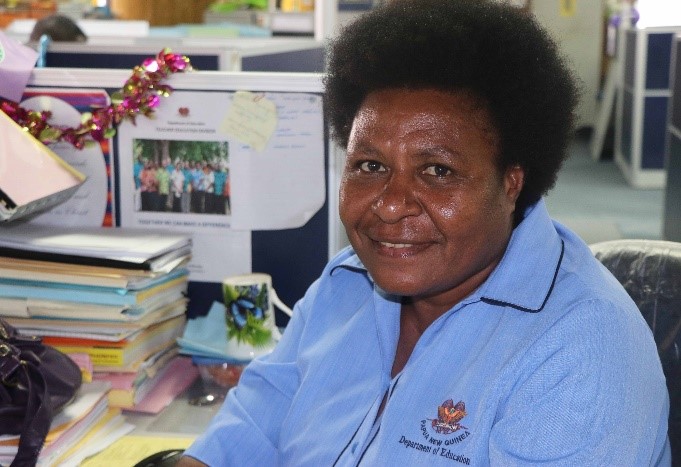Cathy Sowi’s career has revolved around creating better opportunities for children living with disabilities.
The 42-year old from Kubalia in East Sepik Province is single-minded in her determination to create better opportunities for kids across Papua New Guinea, especially those living with disabilities, a journey she began as a primary school teacher specialised in disability services.
She taught for four years before joining the special education sector to work at resource centres in Wewak, Goroka and Port Moresby, assisting firsthand with the challenges faced by children living with disabilities.
While tutoring special education courses in the Highlands, she took up a Bachelor of Education at the University of Goroka and graduated in 2015, which led to an opportunity to join the National Inclusive Education Unit at the Department of Education in Port Moresby.
Cathy’s role is to improve teacher training and enhance the education of young people with disabilities – ensuring teachers in resource centres receive training they need to fully support children aged 3-12 attain standard basic education. Cathy also works with teachers at all levels of education to improve inclusive education for students.
“I believe it’s the best decision I’ve made because from where I’m sitting now my reach is wider,” Cathy said.
“It’s fun working with children and seeing learning take place. This gives me job satisfaction.”
Cathy now supports resource centres working with children living with disabilities, including four in the National Capital District and 19 in regional areas around the country. The centres ensure teachers are well resourced and trained to deliver basic education to these children.
Her dedication didn’t go unnoticed and in 2018 she was selected to participate in the Future Leaders Program through the Pacific Leadership and Governance Precinct – a partnership between Papua New Guinea and Australia that is supporting the development of ethical, capable leaders.
The Future Leaders Program provides training that is vocational, tailor-made for Papua New Guinea’s public sector and offers a pathway for public servants to make the step up to decision making positions.
Cathy believes the intensive program, which was delivered over a nine-month period, boosted her ongoing work with resource centres to provide more inclusive access to education.
“The Future Leaders Program has been very enriching for me,” she said.
“It has enhanced the way I network and work with stakeholders for more impact.”
A critical component of the Future Leaders Program is a major project that requires participants to apply their learning in the workplace, bringing benefits to both individual and organisation.
Cathy used this opportunity to assess inclusive education programs implemented by three primary schools in the National Capital District and was able to secure 23 Elementary Standard Based Curriculum (SBC) kits for resource centres around the country. This included making links with colleagues in the Curriculum Development Unit and service providers after presenting at a workshop with inclusive education teachers.
“All our resource centres now have SBC kits. This is already a positive step because our teachers are teaching the same curriculum the Department has developed,” she said.
“We are now assisting with teaching and learning materials, teaching strategies and training our teachers on how they can modify and adapt the contents of the SBC kits to suit the needs of the children with disabilities.
“I’m not hoping for big things to happen overnight. I’m happy because I love what I’m doing – it’s part of my job and I can already see improvements taking place at a small-scale and that’s the way to go.”
With the successful completion of her project Cathy showed how to put course theory in to practice.
She is one of 132 public servants who have completed the Future Leaders Program since it was launched in 2017. Women have represented more than half of this number and two-thirds of participants were from provincial and district levels.
The challenging and engaging course program comprised of skills-based training, peer-to-peer learning, participatory exercises, class discussions and academic course work – all aimed at strengthening core public service skills, including leadership capabilities, strategic thinking and policy development.
Training was only part of the program and, as with all Precinct activities, it encouraged the sharing of experiences, networking and collaboration.
The Future Leaders Program is run as collaboration between Precinct partners: the Pacific Institute of Leadership and Governance, the University of Papua New Guinea’s School of Business and Public Policy and the University of Queensland, and with guidance from the Department of Personnel Management.
It is also underpinned by key PNG Government policies – the Ethics and Values-Based Executive Leadership and Management Capability Framework, and the Gender Equity and Social Inclusion Policy.
Cathy and several other Future Leaders Program participants from the Department of Education have planned to conduct in-house training for staff on the principles ingrained in these policies, sharing their learning within the organisation.
“Am I honest, accountable, respectful, responsible, and am I using my wisdom? Do I act with integrity?” Cathy said, rhetorically echoing the Leadership Capability Framework.
“Coaching and mentoring are very helpful, and I found the six key leadership values challenging. These lessons have helped me a lot,” said Cathy.
Cathy’s drive, perseverance and leadership will see further improvements to inclusive educational practices in Papua New Guinea.
No matter the challenges that come with her role, Cathy believes she is in the right spot and doesn’t plan to stop moving forward now.
For further information, including access to related materials, please contact the Australian High Commission media team: +675 7090 0100

Cathy Sowi
